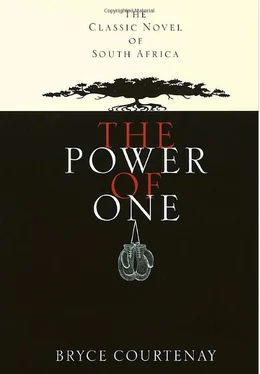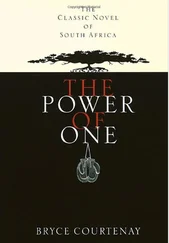Брайс Куртенэ - The Power of One
Здесь есть возможность читать онлайн «Брайс Куртенэ - The Power of One» весь текст электронной книги совершенно бесплатно (целиком полную версию без сокращений). В некоторых случаях можно слушать аудио, скачать через торрент в формате fb2 и присутствует краткое содержание. Жанр: Современная проза, на английском языке. Описание произведения, (предисловие) а так же отзывы посетителей доступны на портале библиотеки ЛибКат.
- Название:The Power of One
- Автор:
- Жанр:
- Год:неизвестен
- ISBN:нет данных
- Рейтинг книги:3 / 5. Голосов: 1
-
Избранное:Добавить в избранное
- Отзывы:
-
Ваша оценка:
- 60
- 1
- 2
- 3
- 4
- 5
The Power of One: краткое содержание, описание и аннотация
Предлагаем к чтению аннотацию, описание, краткое содержание или предисловие (зависит от того, что написал сам автор книги «The Power of One»). Если вы не нашли необходимую информацию о книге — напишите в комментариях, мы постараемся отыскать её.
The book is made to movie with the same name.
The Power of One — читать онлайн бесплатно полную книгу (весь текст) целиком
Ниже представлен текст книги, разбитый по страницам. Система сохранения места последней прочитанной страницы, позволяет с удобством читать онлайн бесплатно книгу «The Power of One», без необходимости каждый раз заново искать на чём Вы остановились. Поставьте закладку, и сможете в любой момент перейти на страницу, на которой закончили чтение.
Интервал:
Закладка:
‘Present, Sarge,’ de la Cour said softly.
‘Look lively now, lad. Put some Marmite into it!’ He glanced briefly at his note pad. ‘Atherton!’
‘Present, sir!’ the kid next to me shouted so that we all jumped.
‘Don’t call me sir!’
‘Present, Sarge,’ the blond boy with pale blue eyes said, this time more quietly.
‘Atherton? You have a brother at school, in forty-three?’
‘My cousin, sir,’ Atherton replied.
‘Sarge! When I want to be a gentleman I’ll bloody well tell you. It’s obvious, Atherton, all the brains in your family went to your cousin.’
‘Yes, Sarge,’ Atherton said, his face a deep beetroot.
‘Best fly-half in the school’s history, got his colours in form four, let’s hope you follow in his footsteps, Mr Atherton. If you do I shall forgive you this one indiscretion. Now look sharp, lad.’
Sergeant Major Bolter consulted the tiny notepad once again. ‘Peekay!’
‘Present, Sarge!’
‘Peekay? No initial, just Peekay? What sort of a name is that, pray tell?’
‘It’s what I’ve almost always been called, Sarge.’
‘Well I’m afraid that won’t do, it’s not Christian, lad. A gentleman always has two names at the very least. That is if he isn’t a lord. You’re not a lord or a duke, are you?’
‘No, Sarge. It’s just my name. Miss Bornstein wrote to the school and explained.’
Sergeant Major Bolter sighed deeply and bowed slightly towards me with a pretend smile on his face. ‘Oh she did, did she now? Well that’s settled then, isn’t it? I mean if Miss Bornstein asked, we can’t quibble over a small matter like a gentleman’s Christian name and surname being one and the same, can we?
‘I’m not a gentleman either, Sarge,’ I said, my voice trembling slightly. I knew I was in trouble but I thought it might be best to clear up any misconceptions in one hit. The kids around me giggled with the exception of Hymie who gave me a light nudge with his elbow.
The sergeant major’s moustaches seemed visibly to bristle as he drew himself up to his full height. ‘I’m the only one around here who’s allowed not to be a gentleman, lad,’ he announced, as though the subject was closed to further discussion.
‘Ryder!’ A boy with dark hair and piercing blue eyes jumped to a sort of attention.
‘Present, Sarge! It’s Cunningham-Ryder, Sarge, with a hyphen.’
Sarge looked at him and gave a meaningful sigh. ‘And, Mr Cunningham-Ryder with an ’ifin, do we have a Christian name to go with our double-barrelled moniker?’
‘Yes, Sarge. George Andrew Sebastian, Sarge.’
‘Well, now, that’s more like it, ain’t it, lads? Cunningham-Ryder has three Christian names and two surnames and Peekay has none. What do you say to that?’ The relief I felt at being passed over was short-lived, the bastard was going to have another go.
Levy gave me a small dig with his elbow. ‘Perhaps Cunningham-Ryder can give Peekay one of his names, Sarge?’ he said. We all turned to look at him, stunned at his audacity.
‘What’s your name, lad?’ Sergeant Major Bolter asked softly, which did nothing to conceal the terrible menace in his voice.
‘Levy, Sarge. Hymie Levy, and I’m not a gentleman or a Christian. I’m a Jew. My dad had to pull all sorts of strings to get me in.’ He wore an ingenuous expression as he looked directly at the sergeant major.
We all fought back our laughter, but to our surprise Bolter didn’t explode. Turning to his notepad, he said, ‘Levy, here at the Prince of Wales School everyone is a Christian and a gentleman and that includes both you and Mr Peekay.’ He glanced up. ‘Johnson!’ We all looked over at a small freckle-faced boy with red hair who stood next to Levy with his mouth slightly open. ‘Johnson!’ Sarge repeated, raising his voice several decibels. The kid with the open mouth had to be Johnson, he was the only as yet unnamed one among us, but he remained silent, his terror-stricken gaze fixed on the large man. With a sort of stop-start jerky movement he raised his hand.
‘Do we want to do wee-wee, lad?’ I could see Sarge was growing impatient with us all.
‘No, sir,’ Johnson gulped the words out.
‘Do not call me sir, you piss-wit!’ Sergeant Major Bolter yelled and several people walking along the platform stopped to stare at him. And that’s how ‘Pissy’ Johnson came to get his nickname.
I was enormously impressed with Levy. I had never met a Jewish person my age or someone who couldn’t become a Christian even had he wanted to. I knew instantly I liked him. As it transpired Hymie Levy was to become my closest friend, while Paul Atherton, Pissy Johnson and ‘Cunning-Spider’, which is how Cunningham-Ryder was to become known, were the group with whom I mostly went around.
The school charabanc driven by Sarge had taken us through the sky-scrapered streets out through a place called Hillbrow where we followed a tram down into increasingly quieter suburbs. We left the tram at its terminal and drove into a leafy suburb named Houghton where the houses, set in perfectly manicured lawns and brilliant gardens, were bigger than any I had ever seen. The top of the charabanc brushed against the cool dark oak trees that lined the quiet streets. We passed an occasional nanny wheeling a baby carriage with large wheels that even sported springs. All the nannies wore identical black dresses with a starched white pinny and all the baby carriages seemed to have come from the same factory. I wasn’t much for symbols, my life had somehow contrived to be a mixture of people so that social status meant very little to me. Nevertheless I sensed that I was entering a new kind of world with a different set of rules.
We turned into a gateway, through a huge open gate with the crown and three ostrich feathers outlined in its wrought-iron design, and continued down a roadway bordered on each side by giant English oaks. On the way to Wellington House, one of the three boarders’ houses at the Prince of Wales School, we passed an emerald green cricket pitch with a rotating hose chit-chit-chittering a jet of water in a large circle around the pitch. On the far boundary, neatly enclosed by a white picket fence, stood a small white pavilion, behind it grew another row of giant oaks and beyond them rose several sets of rugby posts, still further yet the neo-gothic clock tower of the main school rose above the trees. It seemed the perfect place for a posh school but I was not at all sure that it was the perfect place for the future welterweight champion of the world.
Hymie Levy had seated himself beside me on the ride to school and had set about explaining his theory of survival. We were, he decided, odd-bods, he a Jew and me with only one name. Odd-bods, he asserted, were always singled out by plebeians, the worst kind of which were middle-class, Anglo-South African Protestants, who undoubtedly made up the remainder of the school. I wasn’t quite sure whether belonging to the Apostolic Faith Mission qualified me as a Protestant but I had to agree with him that my background was probably different from that of the other guys in the bus. From my previous bout of boarding school I had already learned that being different doesn’t pay off. This time I was determined to enter the school environment on my own terms. There wasn’t too much I was frightened of and I was fairly confident that I could compete intellectually. It was time to remove my camouflage, all my life I had let others provide for me and while I loved the people who had nurtured and built me intellectually, I felt that emotionally it was time to provide for myself. Everyone on the intellectual side of my life seemed to agree that an exclusive private school education was what I needed, while those on the physical side, mainly the boxing squad, were more than a little dubious about an elitist Rooinek school education. I had been torn between the two, never clearly deciding who I was, changing my camouflage to suit. I had accepted an education at an elitist boarding school while at the same time nurturing my ambition to become the welterweight champion of the world. It didn’t take too many brains to figure out that world champion boxers are not spawned within a system designed to educate upper middle-class Christian gentleman.
Читать дальшеИнтервал:
Закладка:
Похожие книги на «The Power of One»
Представляем Вашему вниманию похожие книги на «The Power of One» списком для выбора. Мы отобрали схожую по названию и смыслу литературу в надежде предоставить читателям больше вариантов отыскать новые, интересные, ещё непрочитанные произведения.
Обсуждение, отзывы о книге «The Power of One» и просто собственные мнения читателей. Оставьте ваши комментарии, напишите, что Вы думаете о произведении, его смысле или главных героях. Укажите что конкретно понравилось, а что нет, и почему Вы так считаете.












